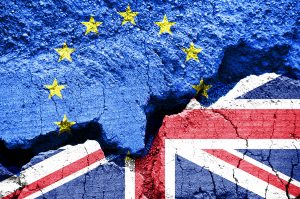Between a Rock and a Hard Place: UK Discovers the Hard Limits of Its ‘Newfound’ Sovereignty
 It is not a good time to be a supporter of Brexit. If spin were a tradeable commodity, all would be exceptionally well in the realm. Alas, it is not. The attempt by Prime Minister Boris Johnson to supplant essential elements of the Withdrawal Agreement, signed with the European Union on January 24, with domestic law has backfired badly.
It is not a good time to be a supporter of Brexit. If spin were a tradeable commodity, all would be exceptionally well in the realm. Alas, it is not. The attempt by Prime Minister Boris Johnson to supplant essential elements of the Withdrawal Agreement, signed with the European Union on January 24, with domestic law has backfired badly.
The surprise move has left the UK up the proverbial creek with few, if any, paddles or friends and drawing strong condemnation from both sides of the Atlantic in a crossfire of diplomatic rage. A hastily-organised damage-control mission by Foreign Secretary Dominic Raab, an accident-prone politician famous for his gaffes, accomplished the near-impossible: Whilst in Washington, Mr Raab singlehandedly succeeded in uniting Republicans and Democrats who in chorus denounced the UK Internal Market Bill tabled by the Johnson cabinet as a breach of international treaty obligations and warned the prime minister that no free trade deal would be contemplated, much less forthcoming, should he insist to ‘throw Ireland under the bus’.
The episode brutally showed the shock-and-awe level of soft power wielded by Dublin. The Irish not only enjoy the full backing of their 26 fellow EU member states but also that of the United States which has long cherished a soft spot for the emerald isle – a sentiment that cuts across the aisle and even seems to mellow President Donald Trump. The proud sovereignty that the UK hoped to regain with its departure from the EU suddenly looks very fragile and limited.
Conundrum
The ‘Irish Question’ – more of a conundrum – centres on the Good Friday Agreement (GFA) of 1998 that clarified and redefined the standing of Northern Ireland within the UK. The US-brokered peace deal put a stop to The Troubles, the three decades of ethno-nationalist violence between British unionists and Irish nationalists. The peace accord eliminated the border between the Republic of Ireland and the six counties of UK-administered Northern Ireland, cementing a union in all but name.
At the time, both Ireland and the UK were members of the EU which facilitated the removal of the physical border. However, the UK’s intention of leaving the union – which it formally did on January 31, 2020 – necessitated a rethink of the Irish border, now to become an external border of the EU after the 11-month transition period ends on December 31.
Both the EU and the UK recognised the sanctity of the GFA and, hence, the need to limit the Irish border to a line on the map as opposed to an actual barrier cutting the landscape – and communities. Years of painful, complex, and often maddingly frustrating negotiations ensued until the British government broke its promise to Northern Irelands unionists and agreed to leave the six counties in the customs union and erect a border in the Irish Sea. Although Parliament balked at this apparent weakening of the UK’s sovereignty, Prime Minister Johnson, fresh in office, ruthlessly rammed the Withdrawal Agreement through the House of Commons – almost literally by hook and crook – in order to remove the last impediment to the UK’s exit from the EU.
That very same prime minister, who illegally prorogued Parliament in order to get his way, is now having second thoughts and has indicated the need to unilaterally tinker with the signed and ratified WA since it is found to infringe on UK sovereignty. The UK Internal Market Bill is designed to address that and, essentially, gives UK ministers the power to ‘disapply’ the WA rules relating to the movement of goods between Great Britain and Northern Ireland. Thus, the UK government may at any time of its choosing lift the agreed-upon sea border.
Distraction
Predictably, the EU is not impressed. At first, EU Commission Vice-President Maros Šefčovič shot from the hip and gave the UK government a two-week ultimatum to withdraw the bill and prove its bona fides – or else. A few days later, Commission President Ursula von der Leyen took a more pragmatic approach and appealed to the UK to restore trust, calling Prime Minister Johnson’s backtracking on the WA a ‘distraction’.
Mrs Von der Leyen also expressed her ‘conviction’ that an EU-UK trade deal was still within reach, even tough Brussels insiders report that the negotiations are ‘getting messier’. A free trade deal, even one limited in scope, would instantly resolve the Irish border issue. Commission President Von der Leyen assured that the EU would not walk away from the negotiations. Her vice-president meanwhile offered Prime Minister Johnson a ladder to climb down from his now untenable position by stating that the bill would violate the WA ‘if adopted as proposed’.
However, the punchline was delivered by the European Parliament which stated unequivocally that any change to the Withdrawal Agreement, however subtle, would result in the summary rejection of an EU-UK free trade deal.
Whilst annoyed with the never-ending antics of Prime Minister Johnson, the powers that be in Brussels seem determined to call his bluff in the knowledge that the Irish hold all the cards: Dublin is not just backed to the hilt by the EU and the US, it also can easily and credibly blame London for any breach of the GFA if and when an actual border is instituted on the island. For a border there must be – somewhere.
Complaints
Whilst the rules of the World Trade Organisation (WTO) do not mandate a border, they do require checks to protect the integrity of internal markets. Absent a border, trade can flow – or seep – unimpeded and unchecked between the EU and the UK via Ireland. Under such a scenario the WTO would likely be inundated with complaints from member states that feel disadvantaged. Should UK exports enter the EU single market freely through the Irish border gap, exporters from other countries could well lodge complaints. Even though the Geneva-based WTO has no enforcement powers, its rules clearly state that, absent a free trade agreement, all trading partners are to be treated equal. The EU is not likely to risk being subjected to lengthy legal procedures and retaliatory tariffs authorised by the WTO.
By opening a can of worms that had been carefully and hermitically sealed, Prime Minister Johnson has played to his domestic audience of increasingly jingoistic Brexiters who loudly demand ‘respect’ for the country’s newfound ‘sovereignty’. However, the current predicament of the rather blustering British prime minister shows that, contrary to what gullible voters had been promised, UK sovereignty – within or without the EU – is not at all absolute: It ends where the neighbour’s sovereignty begins.
In fact, the entire exercise to extract the UK from the European Union has been fraught with mistaken assumptions, outright lies, and promises impossible to keep – from Global Britain striking trade deals galore to a £350 million weekly windfall for the exchequer.
Brexit was never going to end well and has now reduced the UK from a widely respected and admired rule maker to a possible rule breaker in the space of a few months. There is, of course, some poetic justice in plucky little Ireland kicking its former overlord around at will. Whilst that may touch the heartstrings of more than a few Americans, it is not what Dublin or, indeed, Brussels desires. The only thing the EU longs for, after dealing with an unreasonably recalcitrant neighbour and member for years, if not decades, on end, is a relationship devoid of tiresome British exceptionalism – one that mirrors the balance of power and is grounded in realism rather than flights of post-imperial fancy. That, however, is too much to ask – until reality bites.
You may have an interest in also reading…
Ana Botín: Reshaping the Financial Universe
The first woman to lead a major global financial services provider, Ana Botín remains one of only six women at
UK Economic Growth: Beyond the Glitter
The UK economy may be growing at an impressive clip; the spurt is powered by borrowed money and, as such,
CFI.co Meets the Chairman of Ezentis: Manuel García-Durán
A Corporate Turnaround from Rags to Riches. In Spanish business circles, corporate trouble-shooter Manuel García-Durán is gaining quite the reputation.


















































































